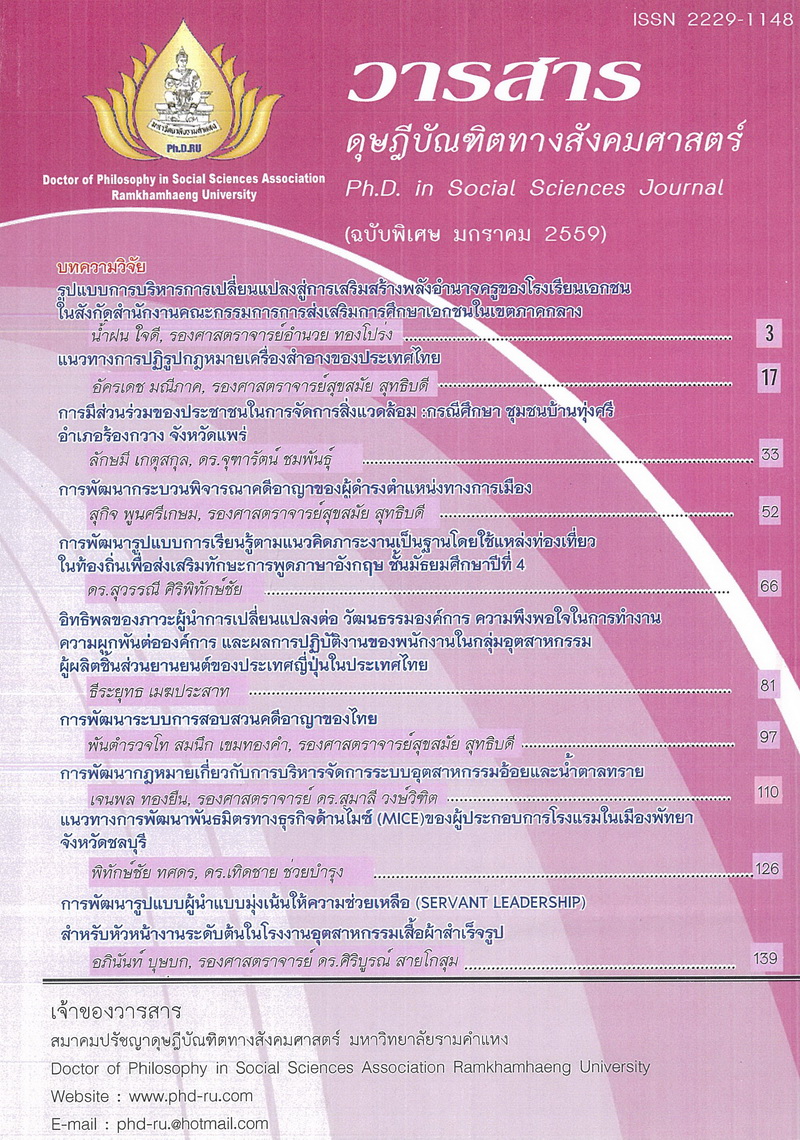รูปแบบการบริหารการเปลี่ยนแปลงสู่การเสริมสร้างพลังอำนาจครูของโรงเรียนเอกชนในสังกัดสำนักงานคณะกรรมการการส่งเสริมการศึกษาเอกชนในเขตภาคกลาง
Main Article Content
Abstract
1. องค์ประกอบของการบริหารการเปลี่ยนแปลงที่มีต่อการเสริมสร้างพลังอำนาจครูของโรงเรียน เอกชนในเขตภาคกลาง พบว่า ปัจจัยด้านโครงสร้าง ปัจจัยด้านคน ปัจจัยด้านวัฒนธรรมองค์การ ปัจจัยด้าน เทคโนโลยี สามารถร่วมกันพยากรณ์พลังอำนาจครูด้านการตัดสินใจ ด้านความก้าวหน้าทางวิชาชีพ ด้านการ รับรู้ความสามารถของตนเอง ด้านสถานภาพ ด้านความเป็นอิสระ ด้านผลกระทบ ได้อย่างมีนัยสำคัญทาง สถิติที่ระดับ.05
2. รูปแบบการบริหารการเปลี่ยนแปลงที่มีต่อการเสริมสร้างพลังอำนาจครูของโรงเรียนเอกชนในสังกัด สำนักงานคณะกรรมการการศึกษาเอกชนในเขตภาคกลาง จากการเชื่อมโยงแนวคิดทฤษฎีการบริหารที่มี ส่วนเกี่ยวข้องกับการบริหารการเปลี่ยนแปลง 4 ด้าน ภายใต้การการบริหารงานอย่างเป็นระบบตามวงจร การบริหารคุณภาพของเดมมิ่ง เพื่อเสริมสร้างให้ครูโรงเรียนเอกชนเกิดพลังอำนาจครู
3. ผลการศึกษาความเป็นไปได้ของรูปแบบการบริหารการเปลี่ยนแปลงที่มีต่อการเสริมสร้างพลัง อำนาจครูของโรงเรียนเอกชนในสังกัดสำนักงานคณะกรรมการศึกษาเอกชนในเขตภาคกลาง พบว่า ความ เป็นไปได้ด้านเทคนิค ด้านเศรษฐกิจ ด้านการปฏิบัติงาน ด้านกฎหมาย มีความเป็นไปได้อยู่ในระดับมากที่สุด
4. การประเมินรูปแบบการบริหารการเปลี่ยนแปลงที่มีต่อการเสริมสร้างพลังอำนาจครูของโรงเรียน เอกชน ในสังกัดสำนักงานคณะกรรมการศึกษาเอกชนในเขตภาคกลาง พบว่า ความถูกต้องครอบคลุมด้าน ความมีประโยชน์ ด้านความเหมาะสม และด้านความเป็นไปได้อยู่ในระดับดีเยี่ยม
A CHANGE MANAGEMENT MODEL OF TEACHER EMPOWERMENT AT PRIVATE SCHOOLS UNDER THE JURISDICTION OF THE OFFICE OF THE PRIVATE EDUCATION COMMISSIONIN THE CENTRAL REGION
In this dissertation, the researcher describes and evaluates a change management model for the empowerment of teachers at selected private schools. As such, the researcher determines (1) the elements of change management involving the empowerment of these teachers. In the next step, the researcher constructs (2) the actual change management model in question. Subsequently, the researcher ascertains (3) the feasibility of the model, and thence, finally, evaluates (4) the model.
Using the multi-stage random sampling method, the researcher selected a research and sample population consisting of 400 teachers and administrators at private schools under the jurisdiction of the Office of the Private Education Commission in the central region. The members of the sample population were selected as questionnaire respondents. A total of 37 teachers participated in a workshop designed to study whether the model was feasible. Twenty administrators were selected to evaluate the model constructed by the researcher. Findings are as follows:
1. In applying multiple regression analysis, the results in regard to the elements of change management in the present connection were as follows: the factors of organizational structure; people; organizational culture; and technology were predictive of teacher empowerment in the aspects of decision making; professional growth; self-efficacy; position; autonomy; and impact at the statistically significant level of .05.
2. In regard to the change management model under consideration, the following was found: the integration of management concepts and theories concerning change management under systematic management as reflective of the Deming cycle of quality management. This approach accordingly encourages these private school teachers to become empowered in decision making; professional growth; self-efficacy; position; autonomy; and impact.
3. Concerning the feasibility study of the change management model, it was found that the model was feasible at the highest level vis-à-vis its technical, economic, operational, and legal aspects.
4. As for the evaluation of the change management model, it was found that the model was correct at an outstanding level in respect to the aspects of usefulness; suitability; and feasibility.
Article Details
Academic articles, research articles, and book reviews in the Ph.D. in Social Sciences Journal are author’s opinions, and not the publisher’s, and is not the responsibility of the Ph.D. in Social Sciences Journal Philosophy Association, Ramkhamhaeng University. (In the case that research is done on human, the researcher has to be trained in Ethics for Doing Research on Human Training and has to produce the evidence of the training).


